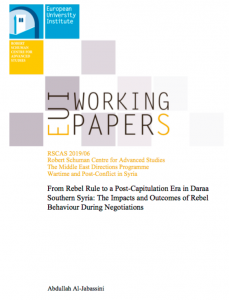 MEDirections is delighted to share the first Working Paper from the Wartime and Post Conflict in Syria project (WPCS).
MEDirections is delighted to share the first Working Paper from the Wartime and Post Conflict in Syria project (WPCS).
WPCS provides operational and strategic analysis of prospects, challenges, trends and policy options in wartime and in preparation for post-conflict in Syria. WPCS is funded by the European Union and is implemented through a partnership between the Middle East Directions Programme/Syria Initiative and COAR (Center for Operational Analysis and Research).
How did rebel rule come to an end in the southern Syria governorate of Daraa? What role did Russia play in negotiating this end? What final agreement was reached? To what extent did rebel behaviour during the negotiations impact the post rebel rule arrangements?
In June 2018, the political and military dynamics of southern Syria once again dominated the headlines. Attacks carried out by Syrian and Russian militaries against rebel-held areas forced rebel leaders to the negotiating table, eventually bringing their rule in southern Syria to an end. In return for their surrender, rebel leaders obtained several promises which Russia vowed to fulfil.
By tracing the sequence of events that began in June 2018, this research examines how the different behaviour of rebel leaders during the negotiations translated to privileges or disadvantages for them and for local civilians in the post-surrender period. This paper also assesses the guarantees made by Russia during the negotiations, finding that preventing armed clashes between Syrian military forces and former rebel groups has been prioritised over other promises.



